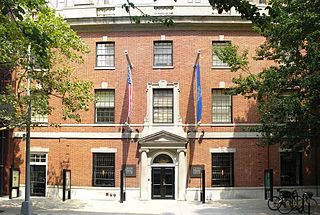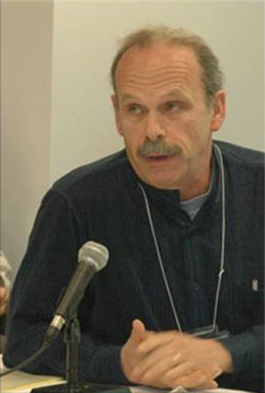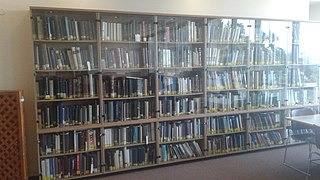
Yiddish is a West Germanic language historically spoken by Ashkenazi Jews. It originates from 9th century Central Europe, providing the nascent Ashkenazi community with a vernacular based on High German fused with many elements taken from Hebrew and to some extent Aramaic. Most varieties of Yiddish include elements of Slavic languages and the vocabulary contains traces of Romance languages. Yiddish is primarily written in the Hebrew alphabet.

The Forward, formerly known as The Jewish Daily Forward, is an American news media organization for a Jewish American audience. Founded in 1897 as a Yiddish-language daily socialist newspaper, The New York Times reported that Seth Lipsky "started an English-language offshoot of the Yiddish-language newspaper" as a weekly newspaper in 1990.

The Yiddish Book Center Yiddish: ייִדישער ביכער־צענטער, romanized: Yidisher Bikher-Tsenter, located on the campus of Hampshire College in Amherst, Massachusetts, United States, is a cultural institution dedicated to the preservation of books in the Yiddish language, as well as the culture and history those books represent. It is one of ten western Massachusetts museums constituting the Museums10 consortium.
Jewish studies is an academic discipline centered on the study of Jews and Judaism. Jewish studies is interdisciplinary and combines aspects of history, Middle Eastern studies, Asian studies, Oriental studies, religious studies, archeology, sociology, languages, political science, area studies, women's studies, and ethnic studies. Jewish studies as a distinct field is mainly present at colleges and universities in North America.

The Tz'enah Ur'enah, also spelt Tsene-rene and Tseno Ureno, sometimes called the Women's Bible, is a Yiddish-language prose work whose structure parallels the weekly Torah portions and Haftarahs used in Jewish prayer services. The book was written by Jacob ben Isaac Ashkenazi (1550–1625) of Janów Lubelski, and mixes Biblical passages with teachings from Judaism's Oral Torah such as the Talmud's Aggadah and Midrash, which are sometimes called "parables, allegories, short stories, anecdotes, legends, and admonitions" by secular writers.

YIVO is an organization that preserves, studies, and teaches the cultural history of Jewish life throughout Eastern Europe, Germany, and Russia as well as orthography, lexicography, and other studies related to Yiddish. Established in 1925 in Wilno in the Second Polish Republic as the Yidisher Visnshaftlekher Institut (Yiddish: ייִדישער װיסנשאַפֿטלעכער אינסטיטוט, pronounced [ˈjidiʃɛr ˈvisn.ʃaftlɛχɛr instiˈtut], Yiddish Scientific Institute, its English name became Institute for Jewish Research after its relocation to New York City, but it is still known mainly by its Yiddish acronym. YIVO is now a partner of the Center for Jewish History. Formerly, they had linguists whose main occupation was deciding on grammar rules and new words, and during this time they were seen in the secular world to serve as the recognized language regulator of the Yiddish language. However, YIVO no longer serves this purpose. Nevertheless, the YIVO system is still commonly taught in universities and known as klal shprakh and sometimes "YIVO Yiddish".

David G. Roskies is an internationally recognized Canadian literary scholar, cultural historian and author in the field of Yiddish literature and the culture of Eastern European Jewry. He is the Sol and Evelyn Henkind Chair in Yiddish Literature and Culture and Professor of Jewish Literature at the Jewish Theological Seminary of America.
The Jewish Public Library or JPL is a public library in Montreal, Quebec, Canada, founded in 1914. The library contains the largest circulating collection of Judaica in North America. The JPL has close to 4000 members, and receives 700 to 800 visitors weekly. A constituent agency of Federation CJA, the Jewish Public Library is independent of the Montreal Public Libraries Network and instead receives its funding from the city's Jewish community, membership fees, donations and endowments.

Project MUSE, a non-profit collaboration between libraries and publishers, is an online database of peer-reviewed academic journals and electronic books. Project MUSE contains digital humanities and social science content from over 250 university presses and scholarly societies around the world. It is an aggregator of digital versions of academic journals, all of which are free of digital rights management (DRM). It operates as a third-party acquisition service like EBSCO, JSTOR, OverDrive, and ProQuest.

Itsye Mordkhe Schaechter was a leading Yiddish linguist, writer, and educator who spent a lifetime studying, standardizing and teaching the language.

Irena Klepfisz is a Jewish lesbian author, academic and activist.

Dovid Katz is an American-born, Vilnius Lithuania-based scholar, author and educator, specializing in Yiddish language and literature, Lithuanian Jewish culture, and the Holocaust in Eastern Europe. In recent years, he has been known for combating the so-called "Double Genocide" revision of Holocaust history which asserts a moral equivalence between Nazi Germany and the Soviet Union. He is editor of the web journal Defending History which he founded in 2009. He is known to spend part of each year at his home in North Wales. His website includes a list of his books, of some articles by topic, a record of recent work, and a more comprehensive bibliography.

Joshua A. Fogel is an American-Canadian Sinologist, historian, and translator who specializes in the history of modern China, especially focusing on the cultural and political relations between China and Japan. He has held a Tier 1 Canada Research Chair at York University in Toronto since 2005. Before that he taught at Harvard University (1981-1988) and the University of California, Santa Barbara (1989-2005).

Yizkor books are memorial books commemorating a Jewish community destroyed during the Holocaust. The books are published by former residents or landsmanshaft societies as remembrances of homes, people and ways of life lost during World War II. Yizkor books usually focus on a town but may include sections on neighboring smaller communities.

Sefaria is an online open source, free content, digital library of Jewish texts. It was founded in 2011 by former Google project manager Brett Lockspeiser and journalist-author Joshua Foer. Calling itself "a living library of Jewish texts", Sefaria relies on volunteers to add texts and translations. The site provides cross-references and interconnections between different texts. Hebrew, Aramaic, and Judeo-Arabic texts are provided under a free license in the original and in translation. The website also provides a tool for creating source sheets.
Academic Studies Press, (ASP) is an independent scholarly publisher of books and journals, based in Boston, Massachusetts.

Erev is a 1983 novel by Eli Schechtman. Erev's first edition is the beginning of Eli Schechtman's novel that was written in USSR and contained four books. The novel was published in in magazine version - from 1961 up to 1968 and in book - in 1965. The novel tells about the life of Russian Jews of the early twentieth century. The full Erev written and published in Israel in 1983 contain seven books. The novel tells about the life of Russian Jews of the early twentieth century until the end of World War II.
Veker is a Jewish journal in the Yiddish language featuring Jewish thought, commentary, essays, history, fiction, humor, and poetry. It has been referred to as "the New Yorker of the Hasidic Yiddish world". The journal is published several times a year. Veker publishes articles that touch on sensitive topics that wouldn't be covered by other Orthodox Yiddish publications. Despite its independent streak, Veker is an Orthodox Jewish publication, and its content adders to what is acceptable under Orthodox beliefs. Although it is published by Hasidic Jews, and mainly for a Hasidic readership, Veker’s mission is to provide a platform to every Speaker of the Yiddish language.

Milgroim. Journal for Art and Literature was a Yiddish cultural magazine that was published between 1922 and 1924 in Berlin by Rimon. At the same time, the Hebrew language magazine Rimon was published in a similar format. Milgroym and rimon means "pomegranate" in Yiddish and Hebrew, respectively.
Kathryn Ann Hellerstein is an American academic and scholar of Yiddish-language poetry, translation, and Jewish American literature. Specializing in Yiddish, she is currently a professor of Germanic Languages and Literatures and the Ruth Meltzer Director of the Jewish Studies Program at the University of Pennsylvania. She is known for her research focus on Yiddish women writers, notably Kadya Molodowsky, Malka Heifetz Tussman, and Celia Dropkin.














